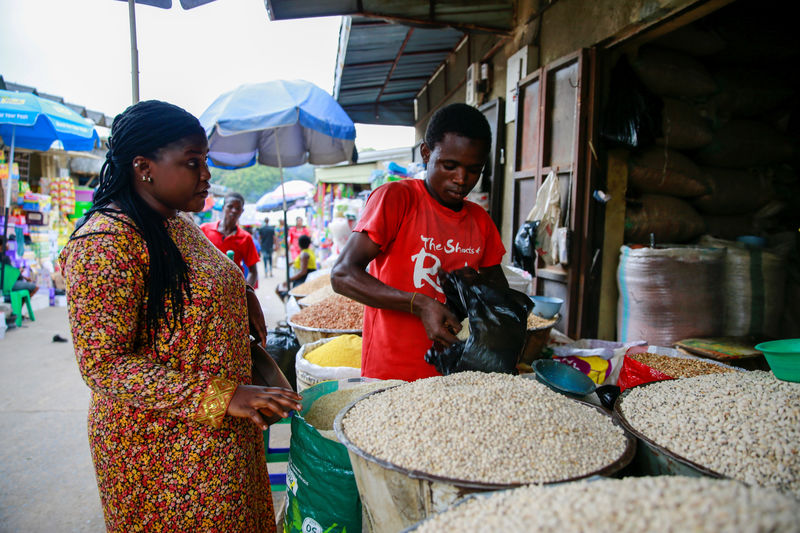Nigerians are complaining of the high cost of food commodities occasioned by poor purchasing power, Daily Trust reports.
Many breadwinners interviewed on Thursday said they can no longer afford to feed their families three times a day as the prices of basic food items doubled in the past few months and their source of income dwindled.
Some traders have attributed the high cost of food items to the inability of farmers to produce enough for domestic consumption while international borders remained closed. Others attributed the problem to the increase in the price of petrol and electricity tariff.
The complaint came at the time President Muhammadu Buhari convoked the meeting of the National Food Security Council (NFSC) where some of the stakeholders also raised the alarm of an impending food shortage in the country and the consequences.
However, some of the attendees expressed optimism of overcoming the impending danger as farmers begun to harvest their produce.
Buhari at the meeting also warned the Central Bank of Nigeria (CBN) not to give a penny to anybody who intends to import food items or fertilizer, insisting that Nigeria has the capacity to feed itself.
It’s tough time for the poor
A survey conducted on commodity price in Kano revealed that at the Dawanau World Grain Market, a 100kg bag of rice popularly known as Jamila is sold at N54, 000 or more, while a 100kg bag of beans is sold at N21, 000.
Similarly, a 100kg bag of old maize is sold at N22, 000 and that of newly harvested maize is sold at N18, 500.
A 100kg bag of millet goes for N20, 000 and a 100kg of garri is sold at N18, 500. An average tuber of yam goes for N650.
Findings revealed that prices of grains are higher in the North East, North Central and most of the states in the southern part of the country.
In Kano, Malam Sagir Bello, a father of seven, said feeding three times a day is gradually becoming very difficult for most families as prices of every food commodity have been increased.
“Many people have resorted to buying what is known as broken rice, which is the last grade of milled rice and even at that, a measure sold at N550 before is now N950 and a measure of maize is now N600. To be honest, survival is becoming so difficult these days,” he said.
In the words of another resident, Malam Ibrahim Abdul, “People now only look for what is affordable and available; prices of food commodities are so high and beyond the reach of the common man. I have two wives and five children and I earn a little above N40, 000. How do I survive in a situation where a 50kg of rice is sold at N26, 000?” he asked.
In Abuja, some artisans who spoke to Daily Trust expressed concern over the sharp rise in food across various markets in the territory.
A bricklayer, Mustapha Ndako, who is a father of six children, said he used to buy a bag of guinea corn that lasts for a month but could no longer afford it.
“I only buy half of a bag these days and therefore my wife has to cut the ration we use daily. Besides, I have six children apart from the three children of my late brother who are staying with me…It is indeed a trying moment,” he said.
Ibechukwu Alfred, who is a vulcanizer, said: “six months ago, I used to buy a bag of rice and half a bag of beans and garri and keep them in my house. But these days I can’t afford it, I only take home what we would eat.”
At Wuse Market, a mudu of local rice is sold at N850, while a mudu of foreign rice is sold at N1, 200. Also, a bag of beans, which was sold at N18, 000 in May, 2020, is now sold at N22, 000.
Prices doubled in Lagos
At Ojodu mini-market in Lagos, the business hub of Nigeria, a bag of rice, which was hitherto sold for N18, 000 is now N22, 000 while a bag of foreign rice, which has been banned but still being smuggled in is sold at N30, 000. Vegetable oil, which was sold for N11, 000 is now N14, 000. Also, a 4-litre paint bucket of garri goes for between N700 and N1000. A 4-litre paint bucket of beans rose from N1, 500 to N1, 700.
Similarly, bread makers under the aegis of the Premium Bread-makers Association of Nigeria (PBAN), said on Thursday that the price of flour, a major ingredient for bread, increased from N10, 500 per 50kg bag to N13, 500 per bag, sugar increased from N13,500 per bag to N29,000 and down to N19,000.
Why we’re promoting self -sufficiency – Buhari
President Muhammadu Buhari on Thursday directed the Central Bank of Nigeria ‘’not to issue a kobo’’ of the country’s reserves for the importation of food items and fertilizer as the federal government rolls out the Economic Sustainability Plan and sets goals for National Food Security.
President Buhari restated his earlier verbal directive to the apex bank at a meeting of the National Food Security Council at the State House, Abuja.
Buhari said that he would pass it down in writing that ‘’nobody importing food should be given money.”
He also directed that blenders of fertilizer should convey products directly to state governments so as to skip the cartel of transporters undermining the efforts to successfully deliver the products to users at reasonable costs.
He told private businesses bent on food importation to source their foreign exchange independently.
‘’Use your money to compete with our farmers’ instead of using foreign reserves to bring in compromised food items to divest the efforts of our farmers.
‘‘We have a lot of able-bodied young people willing to work and agriculture is the answer. We have a lot to do to support our farmers,’’ the president said in a statement issued yesterday by his spokesman, Garba Shehu.
The meeting, chaired by the president with other key members of the council in attendance, was briefed on the food security situation prevailing in the country.
The Vice-Chairman of the council and Governor of Kebbi State, Atiku Bagudu, the Chief of Staff to the President, Prof. Ibrahim Gambari and a governor from each of the six geo-political zones – Jigawa, Plateau, Taraba, Ebonyi, Lagos and Kebbi, made presentations.
The Minister of Finance, Budget and National Planning, Dr. Zainab Ahmed, outlined measures introduced by the administration to tackle the unprecedented challenges from the COVID-19 pandemic on the nation as contained in the Nigerian Economic Sustainability Plan (NESP).
Among others, the minister highlighted that the government will facilitate the cultivation of 20,000 to 100,000 hectares of new farmland in every state and support off-take of agro-processing to create millions of direct and indirect job opportunities.
In his presentation, the Minister of Agriculture, Alhaji Sabo Nanono, told the council that Nigeria expects a bumper harvest of food items despite floods in the north and drought in the south.
Nanono quoted the latest market surveys to show that the recent hike in the price of commodities is being reversed.
On his part, Mr Boss Mustapha, the Secretary to the Government of the Federation and Chairman of the Presidential Task Force on COVID-19 reported the negative impact of the pandemic on the lives and the livelihood of citizens, while the Comptroller-General of Customs, Col. Hameed Ali (Rtd) expressed the hope of an early reopening of the partially closed borders given the progress made with neighbouring states in joint border patrols – one of the key conditions by Nigeria for reopening of the borders.
Hike in food prices a threat to security
The Chief of Staff to the President, Professor Ibrahim Gambari, while speaking at the opening of the council’s meeting, said the recent surge of food prices was gradually evolving to a food crisis with the ability to threaten the nation’s food security.
Gambari underscored the importance of collaboration among all stakeholders to address the challenge of a hike in food prices amid the COVID-19 pandemic and infrastructure challenges.
Gambari said: “Yesterday (Wednesday), my office as the secretariat, National Food Security Council, met with the all agricultural commodity association to ascertain the root causes of the recent spike in food prices and craft mitigating strategies to what could be a potential crisis.
“Although various concerns were raised as the root cause of increase in commodity cost, we have been informed that prices are actually on the decline as new grains have been introduced to the market.
“For example, new maize, which was previously sold for N25, 000 per bag is now being sold between N12, 000 and N17,000 and it is expected to fall to between N7,000 and N8,000 per bag by November 2020, according to the various leaders of agricultural commodity association,” he said.
“The price decline has also been experienced in millet, beans and sorghum. The hike, therefore, is to be seen as a transient situation,” he said.
Daily Trust reports that President Buhari constituted the National Food Security Council in 2018, whose members include the Chief of Defence Staff and the Governor of the Central Bank of Nigeria (CBN).
Among others, the broad objectives of the council include developing sustainable solutions to the farmers-herdsmen clashes, as well as climate change and desertification and their impact on farmland.
Flooding eminent
The Nigeria Hydrological Services Agency (NIHSA) on Thursday warned that states adjoining River Niger may, in the next few days, start to experience heavy floods due to the volume of water at River Niger in Niamey, Niger Republic.
This has heightened fears among farmers of impending losses.
The Director-General of the Agency, Engr. Clement Onyeaso Nze, who raised the alert in Abuja, listed the states to be mostly affected to include Kebbi, Niger, Kwara, Kogi, Anambra, Edo, Delta, Rivers and Bayelsa.
Engr. Clement Nze also alerted farmers to be prepared as more farmlands would be touched by the floods, adding that the incident might spark food insecurity in the country.
He said the agency received information from the Regional Niger Basin Authority that the River Niger flood level in Niamey, Niger Republic attained an unprecedented level of 7.02m, which poses serious danger to the country.
On efforts to mitigate the crisis, the DG said Kainji and Jebba Dams have been preparing to absorb the water coming from Niamey, which will reduce the magnitude of the expected floods.




